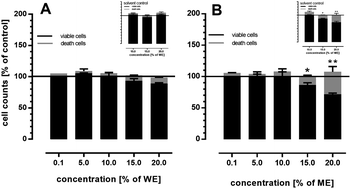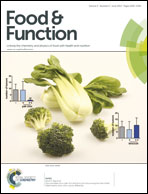Extracts from Brassica oleracea L. convar. acephala var. sabellica inhibit TNF-α stimulated neutrophil adhesion in vitro under flow conditions
Abstract
The beneficial effects of vegetables such as leafy cabbage (Brassica oleracea) on health are attributed to their anti-oxidative and anti-inflammatory potential. Therefore, we investigated whether curly kale extracts affect cytokine induced expression of endothelial cell adhesion molecules as well as the adhesion of leukocytes to endothelial cells depending on their polyphenol content and composition. Curly kale leaves were extracted applying two solvents with different polarities (methanolic extracts (ME) and aqueous water extracts (WE)). The anti-oxidant capacity (TEAC-assay (Trolox Equivalent Antioxidant Capacity)), the polyphenol content and the composition were determined colorimetrically. The anti-inflammatory effects were measured in vitro using human umbilical vein endothelial cells (HUVECs). HUVECs were pre-incubated with extracts for 24 h and thereafter stimulated for 5 h with TNF-α (10 ng mL−1). Finally, the expression of cell adhesion molecules E-selectin, VCAM-1 and ICAM-1 was determined by semi-quantitative RT-PCR and leukocyte adhesion was observed using a flow adhesion assay. ME have the highest anti-oxidant activity (ME, 66.5 ± 10.9 vs. WE, 45.5 ± 6.7 mmol L−1 TEAC), polyphenol (ME, 25.8 ± 2.4. vs. WE, 10.8 ± 1.8 mmol L−1 GAE), flavonoid (ME, 17.9 ± 1.7 vs. WE, 5.3 ± 2.7 mmol L−1 RE) and flavonol concentrations (ME, 5.8 ± 0.6 vs. WE, 2.1 ± 0.5 mmol L−1 RE) in comparison to WE. The TEAC and polyphenol values well-correlated with their effect on cell adhesion. Using 10% ME, reduced adhesion of leukocytes to HUVECs was measured (36 ± 13%), whereas 10% WE reduced cell adhesion to 57 ± 5% of the TNF-α stimulated controls (100%). Concomitant with the reduced leukocyte cell adhesion in the flow assay, ME and WE significantly reduced the TNF-α induced expression of cell adhesion molecules: E-selectin (ME, 51.3 ± 10.7 vs. WE, 76.3 ± 11.9%), ICAM-1 (ME, 74.6 ± 10.2 vs. WE, 81.6 ± 7.9%) and VCAM-1 mRNA expression (ME, 35.0 ± 14.0 vs. WE, 76.6 ± 7.9%) were significantly reduced with 10% extracts. The inhibitory effect of water and methanolic soluble ingredients of curly kale leaves on cell–cell interaction and gene expression events supports their health promoting effect under inflammatory conditions.


 Please wait while we load your content...
Please wait while we load your content...